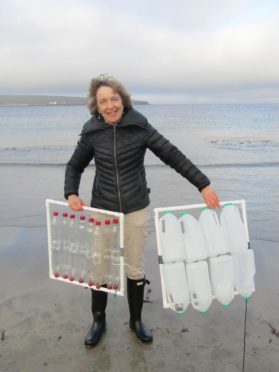Highland scientists are carrying out a study exploring whether thermal imaging cameras can be used to detect marine plastic pollution from space.
The researchers at North Highland College UHI’s Environmental Research Institute in Thurso have received £100,000 from the European Space Agency to conduct the 18-month project.
Dr Lonneke Goddijn-Murphy, a Research Fellow at the Institute who is leading the study, said: “While satellites have been used to detect marine plastic before, this has relied on optical measures which require daylight.
“Using thermal imaging to record plastic pollution from space is a novel idea which excited the European Space Agency.
“The concept is based on the idea that plastic can emit different levels of thermal radiation than the water surface.”
Dr Goddijn-Murphy has devised a series of experiments to test the technology.
She is conducting surveys in the seas around Thurso using drones with thermal imaging cameras.
The tests will be run in summer and winter conditions as well as by day and night.
A research team at the University of the Aegean in Greece is supporting the study by trialling the technique in a different climate.
She added: “The test results looking promising already. If we can show that thermal imaging is an effective way to detect marine plastic pollution, the method could be used alongside other remote measurement techniques.
“For example, it could be useful in identifying clear plastics which are hard to spot using optical measures. It could be used to help evaluate litter reducing policies and to help locate sources and pathways of marine plastic litter.”
Dr Goddijn-Murphy’s project was funded following a European Space Agency ‘basic activities call’ to prepare for the future and find new ways to detect marine plastic litter.
